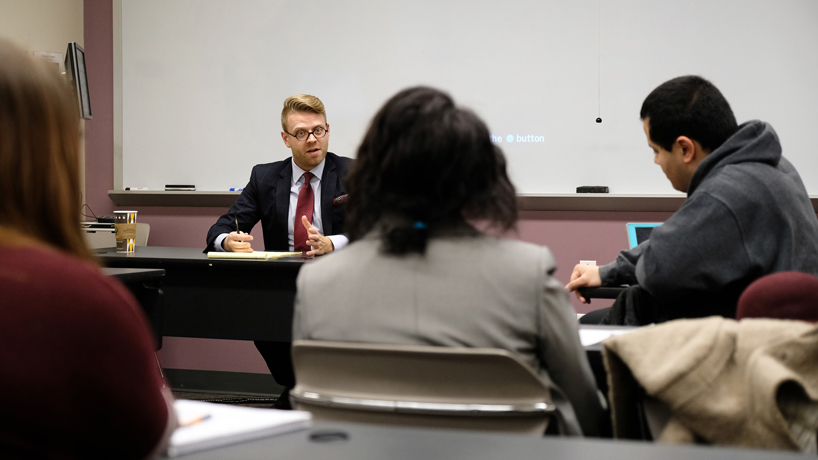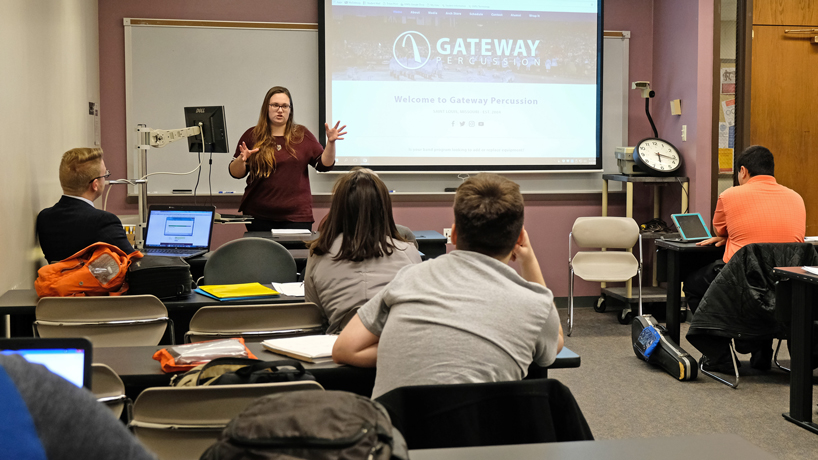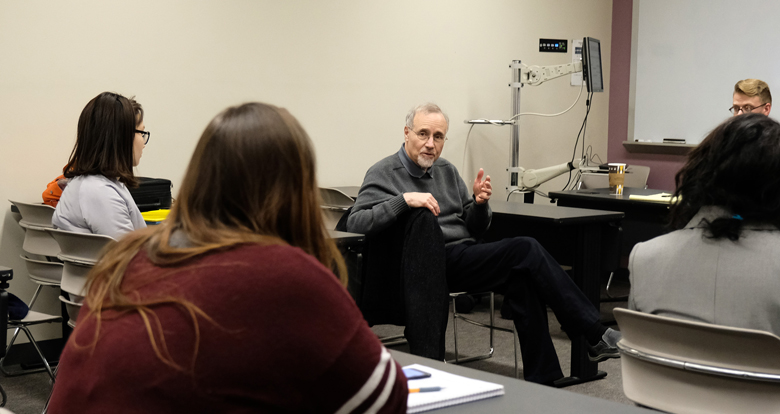
Adjunct Professor Phil Dunlap’s new course, Business in the Arts, has both arts majors and business majors exploring key intersections between two traditionally disparate fields. Part of the university-wide UMSL Accelerate initiative, it’s one of five courses this semester focused on entrepreneurship. (Photos by August Jennewein)
About midway through his current semester at the University of Missouri–St. Louis, double major Dre Williams is already seeing the benefits of what he’s learning in class – one in particular.
Studying both business administration and theater at UMSL, he’s enrolled in a new course, Business in the Arts, that brings those two academic focuses together in a unique way. So far it’s been exactly the kind of instruction he’s looking for.
“This course is important, because it’s definitely aimed at teaching students who want to go into the arts how to also go down the professional part of that path,” Williams says, “the stuff that’s outside of the singing, dancing, playing music or whatever you may be into.”
Under the guidance of Adjunct Professor Phil Dunlap, Williams and 10 classmates who represent a variety of disciplines are exploring everything from decisions about forming an LLC, to entertainment law, to the steps required to turn a good idea into a real-life enterprise.
“The idea is that artists are creative and they’re creators, but if we don’t foster that creativeness in developing your own career, then what are we actually fostering?” says Dunlap, whose own multifaceted career offers useful fodder for discussion. “For me, my main job is Jazz St. Louis, but I have these side projects that are music-related or teaching-related that fall under another category. And if you’re not aware of how they can fit into your life, you can just be caught unawares on a lot of things.”

Katherine Busby gives a presentation in front of fellow students during Business in the Arts class, which goes beyond concepts with an emphasis on practical applications and assignments that focus on bringing good ideas to fruition.
Business in the Arts – along with four other classes newly offered this spring – is a fitting embodiment of a major initiative that UMSL alumnus Dan Lauer, BSBA 1983, and key campus partners have been working to grow university-wide in recent months: UMSL Accelerate.
“Whether a student ultimately starts a business or not, what we are offering is a way of thinking that will hopefully provide skills and confidence to be successful at whatever they choose,” says Lauer, the founding executive director of UMSL Accelerate as well as a serial entrepreneur himself and the creator of Waterbabies. “I want UMSL to be the university that accelerates success.”
Around the time that Dunlap was pondering the idea of proposing a new music business course that would address what he perceived as a curricular gap for some students, Lauer and fellow brains behind UMSL Accelerate were looking to grow a suite of entrepreneurship-focused courses.
“After some meetings, we decided we wanted to make it broader-focused about the arts, so that it might appeal to a theater major or a music major or maybe just a general business major who has an interest,” Dunlap recalls. “And Dan and Ala [Al-Lozi] have let me know that they’re here as a support for anything I need.”
It’s all in keeping with the initiative’s aims to educate, innovate and collaborate across campus in an effort to inspire both students and faculty to further innovation and entrepreneurship.
“The curriculum committee, which has developed the five courses currently being offered, consists of members from business, education and arts and sciences,” explains Charles Hoffman, dean of the College of Business Administration. “A certificate program is expected to be approved in the near term. To aid this process, we lured Professor Chris Miller from Washington University, and he has invited leaders in this [entrepreneurial] field to help teach some of the courses.”

UMSL Chancellor Tom George (center) visits with Business in the Arts students. In addition to his leadership role on campus and scholarly pursuits, George is an accomplished jazz musician – as is the course instructor, Phil Dunlap.
In addition to Dunlap’s class, the offerings include Entrepreneurship/Small Business Management, Introduction to Entrepreneurship, Social Entrepreneurship and Systems for Innovation.
It’s important to realize that every organization wants more innovative employees, Hoffman points out.
“Some of our students may be inspired to start their own businesses,” he says. “Most are likely to work for someone. UMSL Accelerate is designed to give them classroom and internship experiences that prepare them to think in a different way, looking for positive change that will benefit their employers.”
Hoffman also sees UMSL Accelerate both fostering and benefiting from positive change across the university and the region as a whole, including St. Louis’ robust startup community. The Day of Entrepreneurship and Innovation that the College of Business Administration hosted several years ago was a particularly eye-opening turning point.
“We were struck by how many non-business students attended,” Hoffman says. “And after assessing how much effort was already going into innovation and entrepreneurship – over 200 initiatives across campus at the time – we founded UMSL Accelerate.
“In addition to the academic offerings, Dan is spearheading an accelerator for international entrepreneurs who move to St. Louis and a corporate accelerator. We expect a significant announcement of this progress in the coming weeks.”
Indications of community interest continue to be strong, including in terms of corporate support. Both Express Scripts and Civic Progress – an organization of CEOs of the top companies in St. Louis – have invested in the effort.
Meanwhile, UMSL students and faculty like Williams and Dunlap are working to make their own innovative strides each day in class – and thinking ahead as they prepare for the future.
“A lot of things are changing with regard to employment,” notes Dunlap. “With our parents’ and grandparents’ generations, the goal was to find a job and keep it for 40 years, get a pension and retire. But it’s not uncommon today for people to have second or third careers and never actually retire.”
And for artists like himself and Williams, he adds, it’s particularly important to “be in the business, so to speak, of developing your own skills and constantly doing things to add to your arsenal.”
“Dre could find himself 10 years from now living in a different city, teaching acting classes at a community arts organization and maybe doing adjunct work at a university – but then also being active in the theater and dance scene within that community,” Dunlap says. “There are a lot of different outlets, but you have to know how to cultivate an image, how to network, how to build those contacts, and then how to deal with the business side of things, too.”















